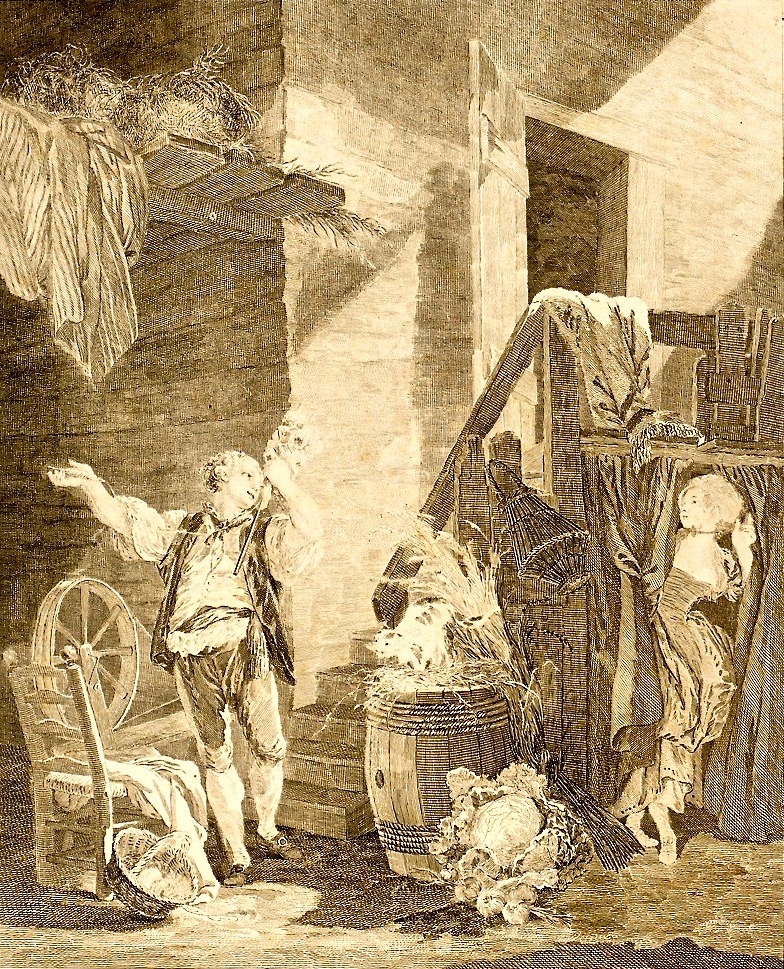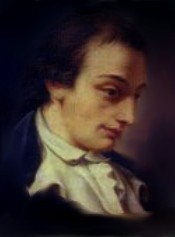|
1764 In Music
Events *April 10 – The Mozart family set out for London, where the 8-year-old Wolfgang Amadeus Mozart meets Johann Christian Bach and writes his Symphony No. 1 (Mozart), First Symphony. *Autumn – Following the death of his patron Keyserlingk, Wilhelm Friedemann Bach leaves his post as organist at Halle, Saxony-Anhalt, Halle. *''date unknown'' – The castrato Domenico Annibali retires from the stage. *Carl Ditters von Dittersdorf becomes Kapellmeister at the court of Adam Patachich in Oradea, Großwardein, replacing Michael Haydn and restructuring the orchestra of the bishop's palace. Popular music *''The Temple of Comus or Every Gentleman and Lady's Beard, Brent and Lowe: Being Songs for the Year 1764'' Classical music *Johann Christian Bach – 6 Keyboard Trios, Op. 2 *Michel Corrette – ''Carillon, ajouté à la Messe des Morts de Gilles'' *Joseph Haydn **Symphony No. 14 (Haydn), Symphony No.14 in A major **Symphony No. 15 (Haydn), Symphony No.15 in D major **Sym ... [...More Info...] [...Related Items...] OR: [Wikipedia] [Google] [Baidu] |
Joseph Kelway
Joseph Kelway (also Kellaway, Kellway; c. 1702–1782) was an English organist and harpsichord player, among the most highly regarded in his day. Kelway was probably born in Chichester. He was the younger brother of the organist Thomas Kelway; he studied with him and with Francesco Geminiani. In 1734, he succeeded Obadiah Shuttleworth as organist of St Michael, Cornhill in London; in 1736 he resigned this post to succeed John Weldon as organist of St Martin-in-the-Fields, London. Charles Burney wrote that Handel was among the musicians who visited St Martin's to hear him play. Kelway became in 1739 a founding governor of the Royal Society of Musicians. His pupils included Charles Wesley and Mrs Mary Delaney, and he was appointed harpsichord master to Queen Charlotte at the time of her arrival in England in 1761. Richard, 7th Viscount FitzWilliam was a patron. Burney wrote that Kelway was "a brilliant harpsichordist", and identified him as "head of the Scarlatti sect", ... [...More Info...] [...Related Items...] OR: [Wikipedia] [Google] [Baidu] |
Jean-Philippe Rameau
Jean-Philippe Rameau (; ; – ) was a French composer and music theory, music theorist. Regarded as one of the most important French composers and music theorists of the 18th century, he replaced Jean-Baptiste Lully as the dominant composer of French opera and is also considered the leading French composer of his time for the harpsichord, alongside François Couperin. Little is known about Rameau's early years. It was not until the 1720s that he won fame as a major theorist of music with his ''Treatise on Harmony'' (1722) and also in the following years as a composer of masterpieces for the harpsichord, which circulated throughout Europe. He was almost 50 before he embarked on the operatic career on which his reputation chiefly rests today. His debut, ''Hippolyte et Aricie'' (1733), caused a great stir and was fiercely attacked by the supporters of Lully's style of music for its revolutionary use of harmony. Nevertheless, Rameau's pre-eminence in the field of French opera was s ... [...More Info...] [...Related Items...] OR: [Wikipedia] [Google] [Baidu] |
L'Abbé Duval
L'Abbé may refer to: Toponyms Canada * Abbé Huard Lake (), Côte-Nord, Quebec *Abbé Huard River (), tributary of the Romaine River in Côte-Nord, Quebec * Ruisseau L'Abbé, tributary of the Pikauba River in Lac-Ministuk, Le Fjord-du-Saguenay, Quebec France * Buigny-l'Abbé, in the Somme department * Camblain-l'Abbé, in the Pas-de-Calais department * Fontaine-l'Abbé, in the Eure department * Hesdin-l'Abbé, in the Pas-de-Calais department *Méricourt-l'Abbé, in the Somme department *Pont-l'Abbé (, "Abbot's bridge"), in the Finistère department * Pont-l'Abbé-d'Arnoult, in the Charente-Maritime department *Stade de l'Abbé-Deschamps, a stadium in Auxerre Jersey * Vingtaine du Mont à l'Abbé, one of six vingtaines of the Parish of Saint Helier Other uses *'' L'Abbé C'', Georges Bataille's 1950 first published novella * Abbe (name) Abbe is both a surname and a given name. As a surname, Abbé is of French origin (from ''abed'' (), "priest"), either as critical nick ... [...More Info...] [...Related Items...] OR: [Wikipedia] [Google] [Baidu] |
Daniel Bayley (musician)
Daniel commonly refers to: * Daniel (given name), a masculine given name and a surname * List of people named Daniel * List of people with surname Daniel * Daniel (biblical figure) * Book of Daniel, a biblical apocalypse, "an account of the activities and visions of Daniel" Daniel may also refer to: Arts and entertainment Literature * ''Daniel'' (Old English poem), an adaptation of the Book of Daniel * ''Daniel'', a 2006 novel by Richard Adams * ''Daniel'' (Mankell novel), 2007 Music * "Daniel" (Bat for Lashes song) (2009) * "Daniel" (Elton John song) (1973) * "Daniel", a song from '' Beautiful Creature'' by Juliana Hatfield * ''Daniel'' (album), a 2024 album by Real Estate Other arts and entertainment * ''Daniel'' (1983 film), by Sidney Lumet * ''Daniel'' (2019 film), a Danish film * Daniel (comics), a character in the ''Endless'' series Businesses * Daniel (department store), in the United Kingdom * H & R Daniel, a producer of English porcelain between 1827 and 184 ... [...More Info...] [...Related Items...] OR: [Wikipedia] [Google] [Baidu] |
Johann Adolph Hasse
Johann Adolph Hasse (baptised 25 March 1699 – 16 December 1783) was an 18th-century German composer, singer and teacher of music. Immensely popular in his time, Hasse was best known for his prolific operatic output, though he also composed a considerable quantity of sacred music. Married to soprano Faustina Bordoni and a friend of librettist Pietro Metastasio, whose libretti he frequently set, Hasse was a pivotal figure in the development of '' opera seria'' and 18th-century music. Early career Hasse was baptised in Bergedorf near Hamburg where his family had been church organists for three generations. His career began in singing when he joined the Hamburg Oper am Gänsemarkt in 1718 as a tenor. In 1719 he obtained a singing post at the court of Brunswick, where in 1721 his first opera, ''Antioco'', was performed; Hasse himself sang in the production. He is thought to have left Germany during 1722. During the 1720s he lived mostly in Naples, dwelling there for six or s ... [...More Info...] [...Related Items...] OR: [Wikipedia] [Google] [Baidu] |
Niccolò Piccinni
Niccolò Piccinni (; 16 January 1728 – 7 May 1800) was an Italian composer of symphonies, sacred music, chamber music, and opera. Although he is somewhat obscure today, Piccinni was one of the most popular composers of opera—particularly the Neapolitan opera buffa—of the Classical period. Life Piccinni was born in Bari, in the Apulia region. From the age of fourteen, he was educated at the Conservatory of San Onofrio by Leonardo Leo and Francesco Durante,. thanks to the intervention of the Bishop of Bari (his father, although himself a musician, was opposed to his son following the same career). Piccinni's first opera, ''Le donne dispettose'', was produced in 1755 with the patronage of Prince Vintimille. In 1760 he composed, at Rome, the ''chef d'œuvre'' of his early life, '' La Cecchina, ossia la buona Figliuola'', an ''opera buffa'' with a libretto by Carlo Goldoni, which "enjoyed a two-year run in Rome and was played in all the important European capitals. It ... [...More Info...] [...Related Items...] OR: [Wikipedia] [Google] [Baidu] |
Rose Et Colas
''Rose et Colas'' is a French opéra-comique in 3 acts by Michel-Jean Sedaine, music by Pierre-Alexandre Monsigny Pierre-Alexandre Monsigny (; – ) was a French composer and a member of the French Académie des Beaux-Arts (1813). He is considered alongside André Grétry and François-André Danican Philidor to have been the founder of a new musical gen ..., first performed on the Théâtre-Français at the Hôtel de Bourgogne on 8 March 1764. on bruzanemediabase ''Rose et Colas'' is mentioned by Honoré de Balzac in the short story '' Une double famille'' (1830). The Lord of Granville is a strong spirit, who hums an aria in Bayeux Cathedral: "Notwi ... [...More Info...] [...Related Items...] OR: [Wikipedia] [Google] [Baidu] |
Pierre-Alexandre Monsigny
Pierre-Alexandre Monsigny (; – ) was a French composer and a member of the French Académie des Beaux-Arts (1813). He is considered alongside André Grétry and François-André Danican Philidor to have been the founder of a new musical genre, the ''opéra comique'', laying a path for other French composers such as François-Adrien Boieldieu, Daniel Auber, Daniel-François-Esprit Auber, Charles Gounod, Georges Bizet, and Jules Massenet in this genre. Biography Pierre-Alexandre Monsigny was born at Fauquembergues, near Saint-Omer, in the former Artois region of France (now Pas-de-Calais), four months before the marriage of his parents, Marie-Antoinette Dufresne and Nicolas Monsigny. He was educated at the Walloon Collége des Jésuites in Saint-Omer. It was here that he first discovered his aptitude for music. As the eldest child, in 1749, a few months after his father's death, he left for Paris with only a few coins in his pocket, a violin and a recommendation letter, in a ... [...More Info...] [...Related Items...] OR: [Wikipedia] [Google] [Baidu] |
Andrea Luchesi
Andrea Luca Luchesi (also spelled Lucchesi; 23 May 1741 – 21 March 1801) was an Italian composer. He knew Mozart and Beethoven. Biography Andrea Luchesi was born at Motta di Livenza, near Treviso the eleventh child of Pietro Luchese and Caterina Gottardi. The rather wealthy family descended from groups of noble families who had moved from Lucca to Venice in the 14th century (hence the name Luchese; from 1764/65 Andrea began to use the name Luchesi, which we can find written by his contemporaries also as Lucchesi, Lughesi, Luckesi, Lucchezzy, etc.). He grew up in his native town, receiving musical and general education from his elder brother Matteo, a priest, public tutor and organist. By 1757 he moved to Venice. The protection of the nobleman Jseppo Morosini enabled him to study with eminent musicians: Gioacchino Cocchi, ''Padre'' Paolucci, Giuseppe Saratelli, Domenico Gallo, Ferdinando Bertoni and (the best-known of them) Baldassare Galuppi. His career in Venice deve ... [...More Info...] [...Related Items...] OR: [Wikipedia] [Google] [Baidu] |
Pietro Guglielmi
Pietro Alessandro Guglielmi (9 December 1728 – 19 November 1804) was an Italian opera composer of the classical period (music), classical period. Biography Guglielmi was born into the Guglielmi family of musicians in Massa, Tuscany, Massa. His father, Jacopo Guglielmi, was a composer and conductor of the orchestra in the court of the Duchy of Massa and Carrara, Duke of Massa. Pietro received his first musical education from his father who taught him to play bassoon and the viola; eventually becoming a musician under his father at court while still a boy. Pietro's brother, Abate Domenico, was the maestro di cappella at the Massa Cathedral, and Pietro studied the organ under him. A child prodigy, Guglielmi's talent as a musician earned him the favor of the Duke of Massa who took an interest in supporting his musical development. The Duke initially paid for Guglielmi to have formal musical training with Jacopo Puccini (the great-great-grandfather of Giacomo Puccini) in Massa, an ... [...More Info...] [...Related Items...] OR: [Wikipedia] [Google] [Baidu] |
Christoph Willibald Gluck
Christoph Willibald (Ritter von) Gluck (; ; 2 July 1714 – 15 November 1787) was a composer of Italian and French opera in the early classical period (music), classical period. Born in the Upper Palatinate and raised in Bohemia, both part of the Holy Roman Empire at the time, he gained prominence at the House of Habsburg, Habsburg court in Vienna. There he brought about the practical reform of opera's dramaturgical practices for which many intellectuals had been campaigning. With a series of radical new works in the 1760s, among them ''Orfeo ed Euridice'' and ''Alceste (Gluck), Alceste'', he broke the stranglehold that Metastasio, Metastasian ''opera seria'' had enjoyed for much of the century. Gluck introduced more drama by using orchestral recitative and cutting the usually long da capo aria. His later operas have half the length of a typical baroque opera. The strong influence of French opera encouraged Gluck to move to Paris in November 1773. Fusing the traditions of Italian ... [...More Info...] [...Related Items...] OR: [Wikipedia] [Google] [Baidu] |



